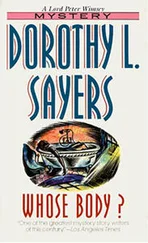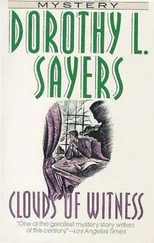Dorothy Sayers - The Wimsey Papers
Здесь есть возможность читать онлайн «Dorothy Sayers - The Wimsey Papers» весь текст электронной книги совершенно бесплатно (целиком полную версию без сокращений). В некоторых случаях можно слушать аудио, скачать через торрент в формате fb2 и присутствует краткое содержание. Жанр: prose_military, на английском языке. Описание произведения, (предисловие) а так же отзывы посетителей доступны на портале библиотеки ЛибКат.
- Название:The Wimsey Papers
- Автор:
- Жанр:
- Год:неизвестен
- ISBN:нет данных
- Рейтинг книги:5 / 5. Голосов: 1
-
Избранное:Добавить в избранное
- Отзывы:
-
Ваша оценка:
- 100
- 1
- 2
- 3
- 4
- 5
The Wimsey Papers: краткое содержание, описание и аннотация
Предлагаем к чтению аннотацию, описание, краткое содержание или предисловие (зависит от того, что написал сам автор книги «The Wimsey Papers»). Если вы не нашли необходимую информацию о книге — напишите в комментариях, мы постараемся отыскать её.
in 1939 and 1940, purporting to be between characters from the Wimsey novels. Aside from their interest to fans of Sayers, who would like to know more about her characters and about her views on the war, they're also interesting pieces of social history — these must be one of the last few pieces of writing where the word 'propaganda' is used in a neutral meaning, for example.
The Wimsey Papers — читать онлайн бесплатно полную книгу (весь текст) целиком
Ниже представлен текст книги, разбитый по страницам. Система сохранения места последней прочитанной страницы, позволяет с удобством читать онлайн бесплатно книгу «The Wimsey Papers», без необходимости каждый раз заново искать на чём Вы остановились. Поставьте закладку, и сможете в любой момент перейти на страницу, на которой закончили чтение.
Интервал:
Закладка:
TALBOYS,
GREAT PAGFORD, HERTS.
15.1.40.
Dear Uncle Paul,
Your amusing letter came just in time to put me in a good temper and prevent me from writing a stinker to Helen, which would only have aroused family prejudice and done the Ministry of Instruction and Morale no good at all. I've sent her a postcard, and make my complaint to your sympathetic ear instead.
It was only a trifle, really. For the last four months I have been badgering H. for speakers for our W.R.I., and get nothing but evasive promises. Now the M.I.M. want to send someone down, and Helen is "astonished" because I can't let her have a date before the summer. She knows perfectly well that we have to get our lists our early — she had plenty of experience of that kind of thing at Duke's Denver. But because she is in an official position, she pretends to be "astonished."
The rulers of this country seem to live in a perpetual state of "astonishment." They are "astonished" that anybody should think the German propaganda needs answering — surely the spirit of the people is too good to allow them to listen to what the Germans say. (It jolly well needs to be good — you can depress the boldest spirit by neglect and indifference, and it's not fair to leave the common man to defend his bit of the moral front without leaders or weapons.) The P.M. is reported to be "astonished" at the "strong reaction" among the people and in the Press over the Belisha business. But obviously the people are going to get a bit of a jolt when the War Office swaps horses in mid-battle, so to speak, without any warning or preparation; and obviously the Press, who have been suffering from headline-starvation for weeks, are going to smack their lips over the feast — so why be "astonished"?
When the Russo-German Pact was signed, the Government proclaimed themselves not only "astonished", but "astounded" and "thunderstruck." If they were, they'd no business to be, since any intelligent person who could read had had the probability of something of that kind dinned into his mind for months and years. Governments ought to be able to read, and they ought to know how people are going to react to things. If they are "astonished," then it simply means that they don't know how the people of this country are thinking and feeling — which is the one thing that a representative government must know, or what is it there for? I'm quite sure Queen Elizabeth and Queen Victoria didn't spend their time being "astonished" by their subjects' feelings — they knew; and Ministers and Parliaments ought to know, too — they're paid to know it. If novelists weren't better psychologists than politicians appear to be, they might whistle for their royalties. And yet writers are supposed to be a dreamy, unpractical lot! But one can't blame the politicians too much. The people put them where they are, under the impression that "practical men" are the sort to get things done. As a nation we don't trust men of imagination and don't put them in power, so we've really only ourselves to thank when our leaders are "astonished" at every glimpse of the obvious.
And it's true that the "imaginatives" tend to hold aloof from public affairs. They feel it's their job to show and to teach, and leave the rest of the world to do the organising; but it looks as though, without imagination, you can't even organise things properly. And all the time there's this perpetual fight against stupidity, and the commercial mind that battens on stupidity. Trying to get people to see and act with imagination is like trying to hack one's way through a jungle with a penknife. But if you give up trying — well, there's Germany to look at. Even the low-brows ought to realise by now that a country that allows its intellectuals to be rendered completely impotent is not a very edifying spectacle.
So much for that — and now read me your little lecture on "la raison" and the superiority of the French attitude to life. I quite agree it's time we went back to learning from the French. They are our Allies, and we shared their civilisation for a good many centuries!..
(The remainder of the letter deals with family affairs)
17. Mr. Paul Delagardie to Lady Peter Wimsey at Talboys
CHATEAU L'OREILLER,
EDREDON-SURE-LE-NEZ,
LA GRIPPE,
ANGLETERRE.
January 22nd, 1940.
My dear Harriet,
As you will see by the address, I have fallen victim to the English climate. Rassure-toi. My malady has passed the feverish and entered the catarrhal stage; I mention it only to excuse the inelegance of my handwriting and certain lack of intellectual clarity which will no doubt betray itself in my epistolary style.
My child, I hasten to answer your letter which finds me full of sympathy. It is indeed a strange misfortune that in the England of today the two most excellent of her national characteristics should have suffered a public divorce. I refer, of course, to the poetic imagination and the talent for practical statesmanship. I believe this has never been the case before, or never to the same extent. Francis Bacon was no isolated phenomenon. That poets should be politicians and diplomats men of letters was a commonplace so long as England shared her culture with the Continent. Account for it how you will, learning and imagination were never despised until the whole population became — I will not say "educated", for it is not that, but at any rate literate. You see the result of this unhappy development in that lack of vision in plain life of which you very properly complain. And you are right in saying that it is the writers and thinkers who must exert themselves, at whatever personal sacrifice, to close the gap, for if they wait till the other side makes the advance they will wait for ever.
If I say that they order this matter better in France, you will laugh — here is Uncle Paul riding his old hobby-horse. But it is true that the man of letters finds it easier là-bas to secure a recognised place in the machinery of public life. Our neighbours have not that English tendency to regard a man's art and poetry, like his religion, as a private and personal indulgence. It is, I suppose, that very tendency which was held in check so long as English letters and civilisation derived their life blood from the common European source. Even in the fourteenth century the Englishman was held to be insular; yet the educated Englishman of all centuries down to the present was far more cosmopolitan in his method of thought than he is today; and it was he who then guided public affairs. In those days, travel was difficult and, for that reason, educative: one could not make a tour of the world in a few weeks, finding a stereotype of England in every foreign land.
And since, my dear, you propose turning your intelligence to the service of your country, may I mention to you something which gives me considerable pain and disquiet? I am distressed by the failure of all our public bodies and national organs to forge any links of sympathy between ourselves and the French people at this important juncture. True, we have an Allied command; true, we have a united Economic Front — but there it seems to me to end. Neither in the newspapers, not in broadcasting, nor in any other way do I detect any attempt to make Britain aware of France nor yet to recommend Britain to the French. We treat our partner, indeed, as the Englishman treats his wife — we love, honour and take her for granted. this seems to me a great folly, as well as a great discourtesy. A true understanding between our two countries would be a noble foundation for an intelligent peace and a united Euope — yet I think we felt more in common with France in the days when she was our "sweet enemey" than we do today, when she is our closest friend and ally. And we ought to take pains to understand France, for there is a great community of culture and interests, despire a great difference of language and temperaments. Understanding under these circumstances is easier, perhaps, than with a nation like America, where a likeness of language tends to obscure from us a profound unlikeness of tradition and outlook
Читать дальшеИнтервал:
Закладка:
Похожие книги на «The Wimsey Papers»
Представляем Вашему вниманию похожие книги на «The Wimsey Papers» списком для выбора. Мы отобрали схожую по названию и смыслу литературу в надежде предоставить читателям больше вариантов отыскать новые, интересные, ещё непрочитанные произведения.
Обсуждение, отзывы о книге «The Wimsey Papers» и просто собственные мнения читателей. Оставьте ваши комментарии, напишите, что Вы думаете о произведении, его смысле или главных героях. Укажите что конкретно понравилось, а что нет, и почему Вы так считаете.












